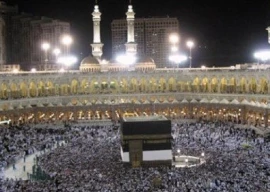
The head of the Jamiat Ulema-e-Islam-Fazl (JUI-F) took an indirect swipe at the ongoing Operation Zarb-i-Azb and the National Action Plan (NAP), arguing that force alone cannot banish terrorism from Pakistan.
“Critics of the NAP have increased in the country,” JUI-F chief Maulana Fazlur Rehman told a news conference on Sunday, noting that his party had opposed both the NAP and the Army Act when they were being enforced last year.
“Today time has proved that force is not the solution to eliminate terrorism,” said Maulana Fazl at the conclusion of a two-day Majlis-e-Shura conference of his party.
He said that the party had called a Majlis-e-Shura conference to review the overall situation in the country. He went on to say that the party had expressed its concern over the deteriorating law and order situation and urged the government to review the decision of the Army Act and the NAP.
“I had strongly opposed the NAP and military courts when they were launched but no one paid heed, with the result that today the government is coming in for a lot of criticism over the issue,” he added.
The JUI-F chief said that despite the legislation of the NAP and the Army Act to improve the law and order situation in the country, Charsadda incident took place, which is surprising. He said the NAP and the Army Act were not a divine revelation which cannot be changed and asked the government to seriously think if the use of force was a right decision. “Can peace come in the country through the use of force,” he questioned.
JUI-F, which is also a coalition partner of the ruling PML-N, criticised the federal government and the Punjab government over a crackdown on religious seminaries, especially in Punjab. He said that on the one hand Interior Minister Chaudhry Nisar Ali Khan claimed that seminaries were not targeted, yet on the other, law-enforcement agencies were conducting operations against them and even clerics were not allowed to given sermons.
Fazl said that the Punjab government has banned the Tableeghi Jamaat in universities, which is an unfair step. “Even the Indian government doesn’t impose such a ban against Muslims in their own country,” he said. He described the Tableegi Jamaat as a “peaceful, apolitical organisation” in the country.
Responding to a question, the JUI-F chief pointed out that the Council of Islamic Ideology chief Maulana Muhammad Sherani had issued a statement regarding the blasphemy laws in his personal capacity and the party did not agree to it. Sherani had said that the council could take up for review the blasphemy law if the government sent a request in this regard.
He appreciated the recent trip of Prime Minister Nawaz Sharif and Army Chief Gen Raheel Sharif in Saudi Arabia and Iran to defuse tensions between the two countries. He also expressed satisfaction over the development of China-Pakistan Economic Corridor CPEC and said that his party had confidence over a committee which had been constituted by the prime minister in this regard.
Published in The Express Tribune, February 1st, 2016.

1730360426-0/Menendez-Brothers-(2)1730360426-0-165x106.webp)
1732534556-0/taylor-(14)1732534556-0-165x106.webp)
1725872216-0/Tribune-Pic-(3)1725872216-0-165x106.webp)
1732532771-0/BeFunky-collage-(89)1732532771-0-165x106.webp)

1732530440-5/Copy-of-Untitled-(85)1732530440-5-270x192.webp)

1732534225-0/Express-Tribune-(13)1732534225-0-270x192.webp)








COMMENTS
Comments are moderated and generally will be posted if they are on-topic and not abusive.
For more information, please see our Comments FAQ